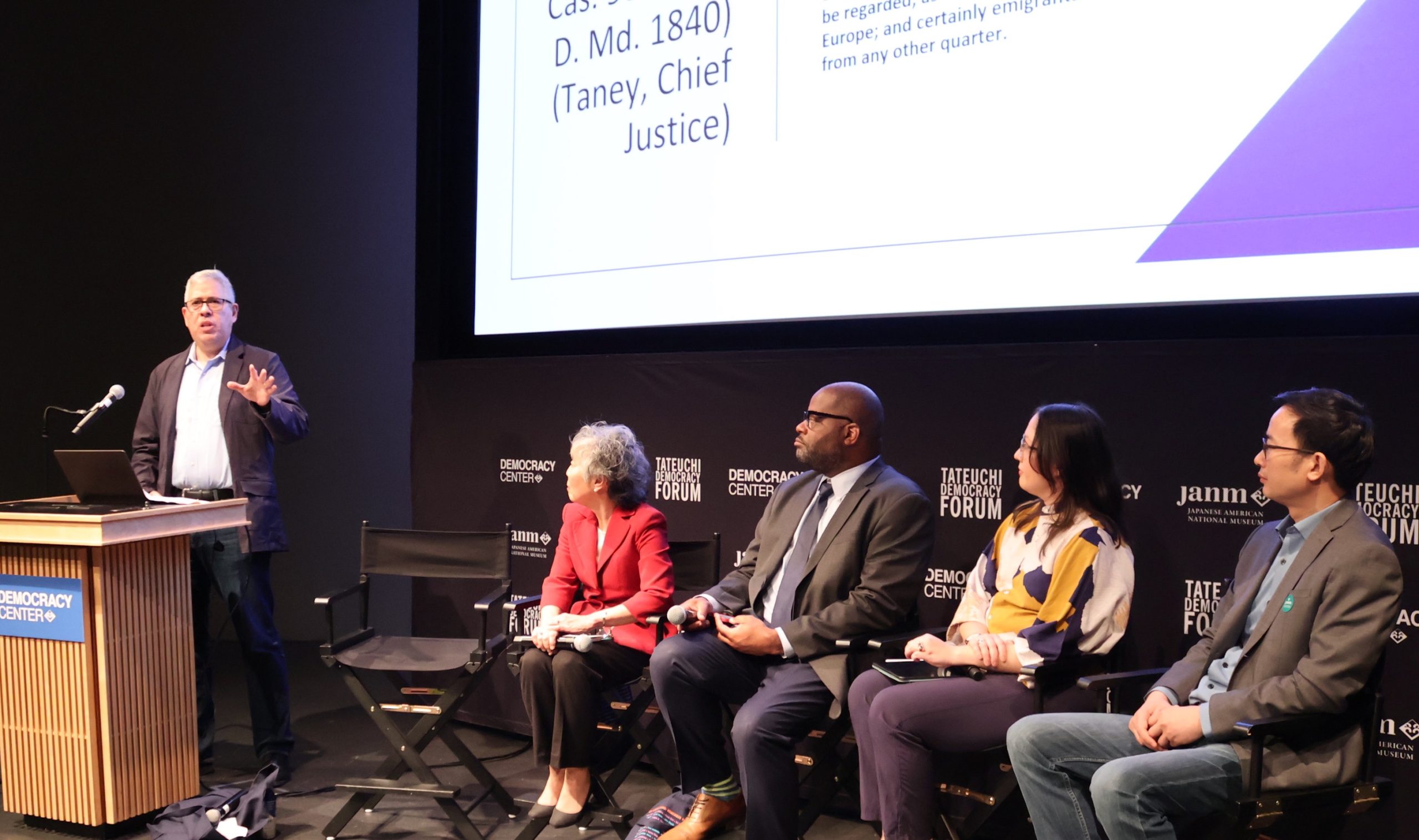From left, “Our Fragile Democracy” panel discussion participants Gabriel Chin, Susan Kamei, Damon Brown, Lisa Doi and Clay Zhu on Feb. 24 in Little Tokyo.
Latest threats to civil liberties test America’s mettle.
By P.C. Staff
(Editor’s note: On June 29, 2023, California’s Reparations Task Force issued its 1,100-page report, commonly referred to as “The California Reparations Report.” It examined how nearly 250 years of slavery, plus another nearly 100 years of “Jim Crow” policies, had a deleterious effect on Americans of African ancestry, extending to the present. It also recommended more than 115 actions that could be taken to remediate the historic harms that resulted, while drawing a throughline of systemic white supremacy in how America has treated racial minorities and indigenous people.
On Aug. 10, 2023, California’s attorney general issued an apology from the state for its role in the mass removal and incarceration of its ethnic Japanese — both U.S. citizens and legal permanent residents then-deemed ineligible to become naturalized citizens — that was the result of President Franklin D. Roosevelt’s Executive Order 9066.
In each instance, an Asian American played vital roles in these reparative justice initiatives. In the former, Japanese American attorney Don Tamaki, whose résumé includes serving as a member of one of the three legal teams that in the 1980s revisited failed attempts to legally challenge aspects of the constitutionality of the mass incarceration of Japanese Americans during World War II in lawsuits brought by Gordon Hirabayashi, Fred Korematsu and Minoru Yasui, using an obscure legal procedure, writ of error coram nobis. Tamaki, senior counsel at San Francisco-based Minami Tamaki LLP, was on the team that overturned Korematsu’s criminal conviction. He is the co-founder of the Asian Law Alliance and has served as the executive director of the Asian Law Caucus. In 2021, California Gov. Gavin Newsom appointed him to serve on the nine-member California Reparations Task Force, of which he was the one member of Asian ancestry.
In the latter, it was Filipino American Attorney General Rob Bonta who led the state’s Justice Department in its effort to revisit California’s complicity in the abrogation of the rights of its residents of Japanese ancestry during WWII — and issue a formal apology.
It was with that backdrop that the National JACL, the Japanese American National Museum, the Florin JACL-Sacramento Valley and California Asian Pacific American Bar Assn. worked together to present Tamaki and Bonta at “Our Fragile Democracy: Historic and Present-Day Attacks on Our Civil Rights and Civil Liberties,” held — and livestreamed — on Feb. 24 at the Tateuchi Democracy Forum at the Japanese American National Museum’s Daniel K. Inouye Center for the Preservation of Democracy.)
“What happened to the Japanese American community at the onset of World War II must never happen again to any other community.”
With those words, William Fujioka, chair of JANM’s board of trustees, set the tone of what was to follow at “Our Fragile Democracy: Historic and Present-Day Attacks on Our Civil Rights and Civil Liberties.”
Preceding Fujioka, however, the event began with a welcome by Deputy Attorney General IV Elizabeth Sarine, one of the event’s sponsors, who introduced master of ceremonies Amy Watanabe, managing director of client services at Nakatomi PR and a former Sen. Daniel K. Inouye JACL Fellow. She in turn introduced Tamaki.
“It’s fitting that we’re here at the Democracy Center because the truth itself, and therefore democracy itself, is under threat as never before. In 2021, the Capitol was defiled. Five people died. Twenty-five thousand troops were deployed to protect the peaceful transfer of power, and millions continue to believe the election was stolen, despite no evidence of that,” said Tamaki in reference to the insurrection that occurred on Jan. 6, 2021, following the November 2020 general election in which Joe Biden defeated Donald Trump in the race for the presidency. “When conspiracy theories take root, and alternative facts hold sway over the real ones, history tells us that society can descend into a very dark place when the truth doesn’t matter.”
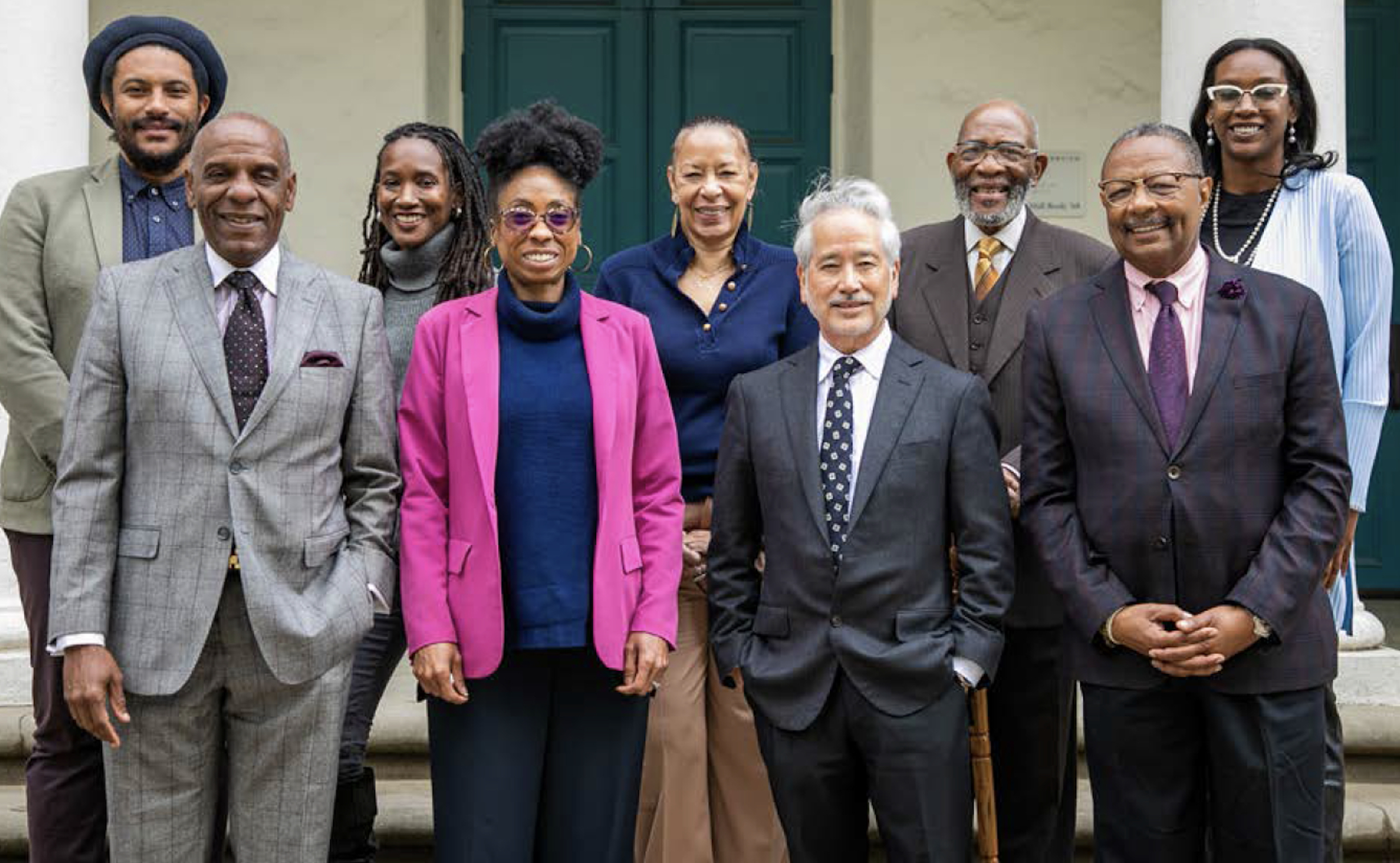
California Reparations Task Force members, from left: Jovan Scott Lewis, Sen. Steven Bradford, Lisa Holder, Councilmember Monica Montgomery Steppe, Cheryl Grills, Donald K. Tamaki, Amos C. Brown, Assemblymember Reginald Byron Jones-Sawyer Sr. and Kamilah V. Moore (Photo: State of California)
After thanking Bonta for “his office’s apology, shining a light on truth and memorializing the fragility of our democracy,” Tamaki recounted how during WWII, some government and military officials conspired to justify the roundup, removal and incarceration of ethnic Japanese in the U.S.
Referring to Gen. John L. DeWitt, who was in part tasked with that role, Tamaki said, “The burden fell on to DeWitt to issue a final report to justify putting Americans into concentration camps. There was only one problem. It was entirely made up, and the government knew it at the time.”
Tamaki went on to describe how DeWitt’s final report differed from naval, FBI and FCC intelligence reports that concluded “Japanese Americans had done no wrong, that there was no reason for the mass removal, and that the Army’s espionage claims were quote, ‘intentional falsehoods.’
“Caught in an ethical dilemma, alarmed Justice Department lawyers became whistleblowers, urging the solicitor general (Charles Fahy) that they had a duty to disclose the evidence and not to lie to the Supreme Court,” Tamaki said. Instead, this evidence was “suppressed altered, and one crucial report was even ordered burned.”
Japanese American redress, not to mention the coram nobis cases, may have never occurred had something completely random and unexpected happened, namely discoveries decades later by attorney Peter Irons and researcher Aiko Herzig-Yoshinaga of documents that disproved the government’s claim that the treatment of those of Japanese heritage was justified for military necessity.
In Herzig-Yoshinaga’s case, she found the one remaining original version of DeWitt’s final report — all other copies had been ordered destroyed — that had been misfiled and described as the “smoking gun” that proved, in actuality, that what the government presented to the Supreme Court in the Korematsu case was not only false but manipulated.
Tying in his experiences as a pro bono attorney for the revived Korematsu case and serving on the Reparations Task force, Tamaki said, “Over the years, I’ve wondered how anti-Japanese American hatred could be so overpowering as to cause all three co-equal branches of government, each designed to be a check and balance on the excesses of the others, to fail so spectacularly. Before serving on the Reparations Task Force, delving into slavery and its aftermath, I viewed the incarceration as a stand-alone example of anti-Asian hate. Now, I view it as a subchapter in a racial pathology that began long before Asian Americans arrived on this country’s shores.”
Viewed from that perspective, Tamaki noted it was the explanation of how, in 1882, “Congress passed the nation’s first travel ban, the Chinese Exclusion Act. During this ultraracist era, Japanese immigrants arrived, a slew of anti-Asian legislation followed, including California 1913 alien land laws, prohibiting Japanese immigrants from owning most kinds of real property.” Jumping to the present day, it also explained why, Tamaki relayed, that of the more than 600 organizations that have endorsed African American reparations, more than 50 of them are Japanese American groups.
Bringing things back to the theme of the event, Tamaki asked: “If we don’t face the ugly, inconvenient truth, how do we improve as a nation? More to the point, how do we save our democracy?”
As he approached the end of his speech, Tamaki said, “The truth-telling of the attorney general’s apology and the Reparations Task Force reminds us that democracy is not always lost in a sudden coup d’etat. No, we can lose our democracy incrementally. If alternative facts are trotted out in place of the real ones, if racism shouts louder than the Constitution, if our three-branch system of checks and balances, which was designed to thwart the rise of kings and tyrants, is undermined, and, most importantly, if we fail to stand up and demand truth and accountability to the rule of law, our democratic institutions can end up hollowed out from within to a point that we will no longer recognize them.”
Tamaki’s speech was followed by a “fireside chat” between JANM CEO Ann Burroughs and California Attorney General Rob Bonta, who earlier that day had stamped the Ireichō book-cum-monument at the museum, during which she began by asking him, “What was it that motivated you to issue that apology and why did you feel that it was important to frame it as a reparative apology?”
In part of his answer, Bonta replied, “You can’t change the past. But you can acknowledge it, you must acknowledge it, you can apologize for it — and you can make sure it never happens again and take affirmative steps to do the opposite of the painful thing, the unjust thing, the racist thing.” Bonta also acknowledged that the timing of the apology — Aug. 10, 2023 — was done to coincide with “the 35th anniversary of the Civil Liberties Act of 1988.”
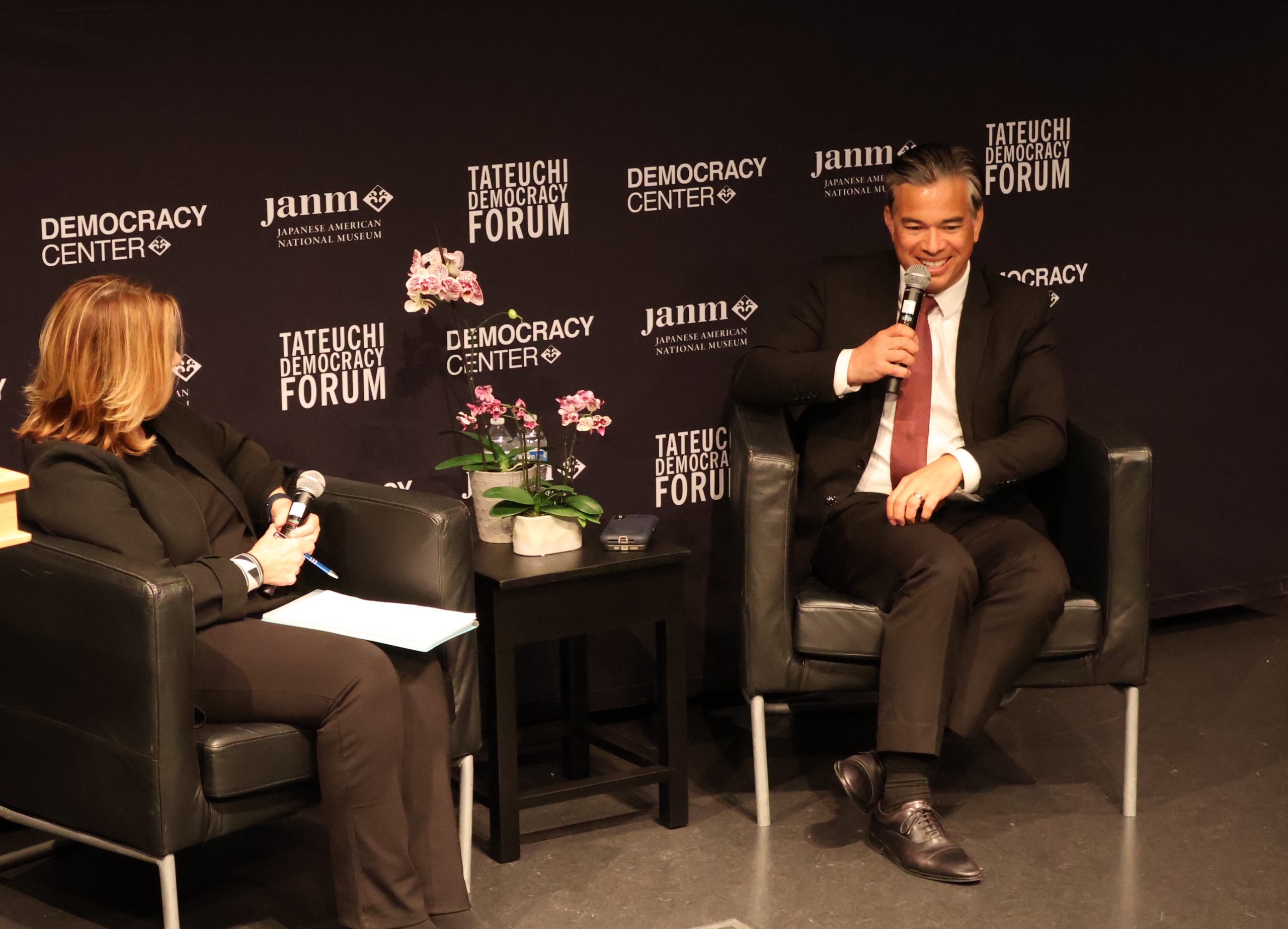
JANM CEO Ann Burroughs, left, chats with California Attorney General Rob Bonta at the Tateuchi Democracy Forum in Little Tokyo on Feb. 24. (Photo: George Toshio Johnston)
Burroughs next asked a question about Bonta’s thoughts with regard to one of his predecessors, namely Earl Warren (1891-1974), who served as the state’s attorney general in 1938, was elected governor in 1943 and would later, as Supreme Court chief justice, become regarded as “one of the most vigorous advocates of civil liberties in the history of the Supreme Court” yet, during his time as governor, “advocate and defend a policy that constituted a wholesale deprivation of the civil rights of Japanese-Americans.”*
Bonta answered, “Earl Warren … he’s known for many things, and this is not one that he’s universally known for — but it’s part of who he is, it’s part of his legacy. … I think that is something that Mr. Warren will have to own, and it will be part of his legacy.”
After replying “it was powerful” to Burroughs’ query about his thoughts with regard to Bonta’s act of stamping the Ireichō, Burroughs asked him to share some of his thoughts regarding points that Tamaki had raised earlier, especially with regard to “the fragility of our democratic institutions” and how “democracy is imperiled in this country.”
“Truth-telling is the antidote and the remedy to much of what ails us in this country . . . to see the throughline with respect to many different groups that have been othered and treated as less-than and seen as dehumanized,” Bonta answered. “You can’t fix the problem until you face it. And it’s what we do next that matters.”
When the chat ended, Watanabe announced a short intermission, which was followed by a panel discussion moderated by University of Southern California Professor Susan H. Kamei, who authored “When Can We Go Back to America? Voices of Japanese American Incarceration During World War II” (Pacific Citizen, Sept. 10, 2021, tinyurl.com/bdey9xp9).
Joining Kamei on the panel were University of California Davis School of Law Professor Gabriel “Jack” Chin; Special Assistant Attorney General Damon M. Brown of the California Department of Justice; Ph.D. candidate Lisa Doi, president of the Chicago JACL chapter, a co-chair of Tsuru for Solidarity and project manager of the new core exhibit at the Japanese American National Museum; and Clay Zhu, managing partner of the Silicon Valley Branch of DeHeng Law Offices and co-founder of the nonprofit Chinese American Legal Defense Alliance.
Echoing Tamaki’s “racial pathology that began long before Asian Americans arrived on this country’s shores” remark about a system that had denied naturalization and land ownership rights to Asian immigrants, not to mention putting Japanese Americans into concentration camps, Chin supplemented his presentation with various slides that showed America’s history of marginalizing the rights of non-European people.
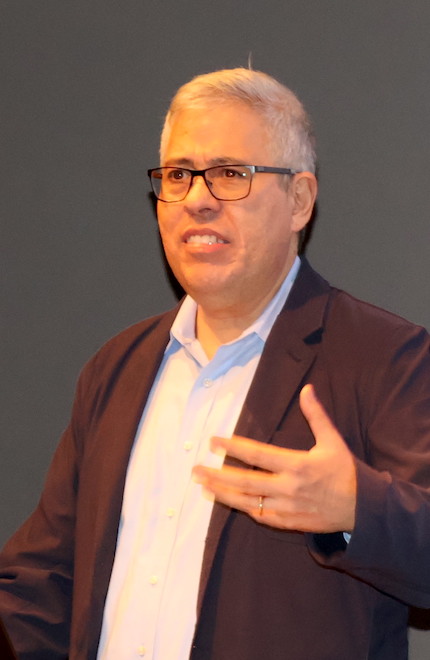
UC Davis Professor Gabriel “Jack” Chin presents a slide deck during the panel discussion portion of the “Our Fragile Democracy” on Feb. 24. (Photo: George Toshio Johnston)
Chin cited the Naturalization Act of 1790, which restricted U.S. citizenship to “being a free white person” and the 1840 case of United States v. Dow, in which the judge, future Supreme Court Justice Roger B. Taney, ruled that Philippines-born Lorenzo Dow of Maryland, despite being a Christian, was not entitled to use the rules of evidence that were reserved for white people in his murder trial of a white sea captain because he was not from one of the “white Christian nations of Europe.”
Chin also cited a unanimous 1922 Supreme Court decision, Ozawa v. United States, which held that because Takao Ozawa, a Japanese immigrant was not white, he “could not naturalize” because racial restriction was a “rule in force from the beginning of the government, a part of our history as well as our law . …”
As for alien lands laws of the past, Chin said, “We have the implementation of these ideas in the California Alien Land Law of 1913. Aliens eligible to citizenship can own land, all other aliens can own land only to the extent that they’re allowed to do so by a treaty. This is still an immigration law. The California Supreme Court said in 1922, ‘What’s the purpose? Why do we have a law that says that only aliens eligible to citizenship can own land?’ Well because we don’t want Japanese people to come to California. And this is a legitimate purpose, it’s an appropriate thing for the legislature to do.”
This legality wasn’t limited to California, however, as Chin also showed a 1926 clipping from a Florida newspaper about a resolution that would bar members of “the mongolian race” from owning property as a means forestalling the “importation into Florida” of Japanese and Chinese people.
Zhu, a self-described “first-generation immigrant from China,” began his remarks by noting that he became a U.S. citizen in 2020. “I never talked publicly about why I did that,” he said, “Well, the reason is, I was scared. The year 2020 was a hard time for Chinese Americans in this country. The pandemic broke out when Donald Trump was in his re-election campaign.
“For the first time in 20-plus years living this country, I did not feel safe. So, I went ahead and got my citizenship. I thought that was my natural protection. I could show my U.S. passport and say, ‘I belong here.’ I quickly realized it did not help because I could not, you know, hide my face and my skin color.” He also went from mostly representing companies in corporate and commercial cases to becoming a legal activist.
In 2020, Zhu and several colleagues formed the Chinese American Legal Defense Alliance. “We basically sue government officials for systematic discrimination against Chinese Americans,” he said. After Florida Gov. Ron DeSantis and the state legislature passed SB 264, which prohibited citizens of China, Cuba, Venezuela, Syria, Iran, Russia and North Korea from buying homes in the state, Zhu said, “The law came out as a great surprise to me because I thought that was something happening 100 years ago.”
CALDA enlisted support from the American Civil Liberties Union to challenge SB 264. (Editor’s note: In mid-April, the U.S. Court of Appeals for the Eleventh Circuit began hearing the challenge to the law. Meantime, on May 6, a group of that includes the Asian Real Estate Association of America filed a lawsuit in U.S. District Court in Miami that contends SB 264 violates the federal Fair Housing Act.)
“Florida is not the only the state,” Zhu said. “Texas just put a similar alien land law bill on its primary election ballot about a couple weeks ago. About a dozen red states are already adopting some alien land laws as we speak. So, it’s a game of Whack a Mole, and I can report to you that I do not feel any safer than four years ago.”
In his segment, Brown picked up on the history and status quo over the laws regarding land ownership. “I don’t think it should be lost on anyone that these laws are taking and depriving individuals of land ownership. Land ownership is directly connected to power and agency in this country,” he said. “You could not vote in this country unless you were a white male landowner, which also disenfranchised poor whites. You could not vote in many places if you were not a landowner. Land ownership entitles you to many benefits of political participation. And so, by taking land, that was a way to disenfranchise people.”
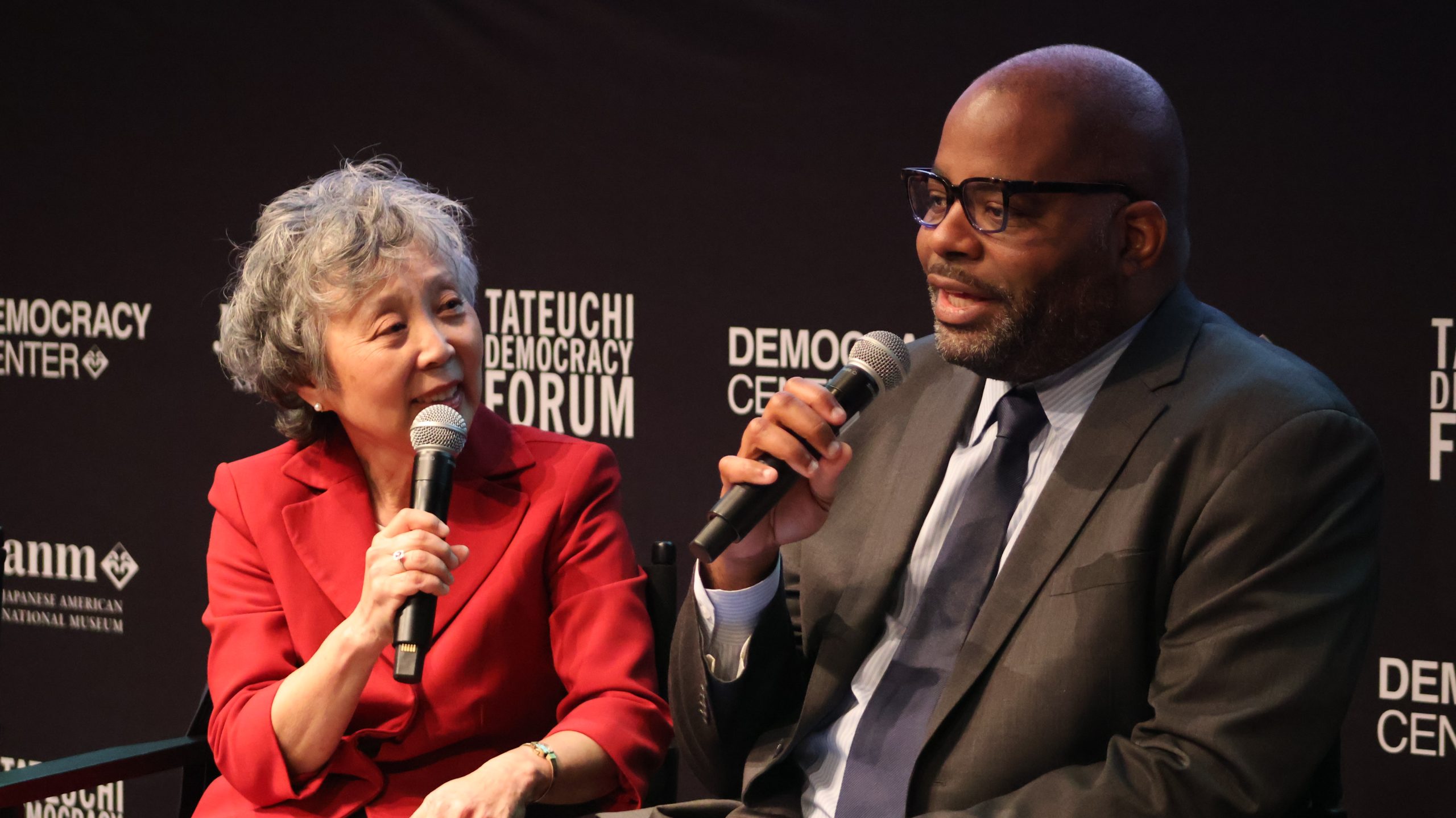
USC Professor Susan Kamei chats with Special Assistant Attorney General Damon Brown of the California Department of Justice during the panel discussion segment of the “Our Fragile Democracy” event on Saturday, Feb. 24 in Little Tokyo. (Photo: George Toshio Johnston)
Brown added, “I think it’s important to continue to have this discussion, understanding why land is at issue here, why that is what is being looked at as a way to disenfranchise, in this case, Japanese and other Asian people here in this country because it’s a threat to white supremacy. And those that would uphold those systems and institutions in this country to maintain power will go to any lengths in order to keep it.”
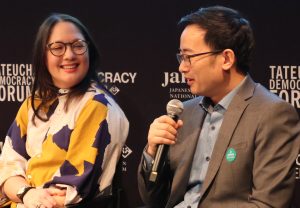
Chicago JACL Chapter President Lisa Doi and Clay Zhu of Chinese American Legal Defense Alliance participate in the “Our Fragile Democracy” panel discussion at JANM’s Tateuchi Democracy Forum in Little Tokyo on Feb. 24. (Photo: George Toshio Johnston)
Doi, who began by noting she was the only nonlawyer on the panel, said she wanted to discuss what Tsuru for Solidarity and JACL at the national and chapter levels, as well as other Japanese American organizations, have been focusing on.
On the topic of reparations, Doi said, “In 2021, Tsuru was asked by several national Black reparations organizations and the ACLU to solicit testimony from the Japanese American community in support of HR 40, which is a piece of federal legislation to do a federal study on the history and legacy of slavery and sort of a study bill about reparations that was mirrored in AD 3121.
“It made it to the House Judiciary Committee, which is the farthest it had ever made it in its nearly 40 years of being introduced on the House floor. And, as I think Don articulated so well, this was, I think, an easy ask in many ways for Japanese Americans to speak out in support of this piece of legislation. And very quickly, we got over 300 letters of testimony in support.”
The other topic Doi discussed had to do with immigration detention. “A week ago, I was in Seattle with some members of Tsuru, who were blockading the entrance to Seattle Federal Building to demand the closure of Northwest Detention Center, which is the largest ICE detention facility in the Pacific Northwest. Some of the folks who were blocking the doors took turns to speak about why they were there.”
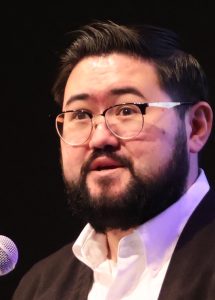
National JACL Education Programs Manager and 2024 “Our Fragile Democracy” committee member Matthew Weisbly. (Photo: George Toshio Johnston)
In a nutshell, their reasons were not just for those who preceded them but also for those who are now growing up, with the hope that they may live in a world where they won’t have to protest these kinds of sites.
After the panel wrapped up its discussion, National JACL Education Programs Manager Matthew Weisbly concluded the event. “So, we stand here today because of Attorney General Bonta and his team for recognizing that what our community went through was wrong and the governmental bodies like his office were wrong for supporting such actions. But as you’ve heard also from our panelists, there’s so much work that needs to be done.”
Sponsors for “Our Fragile Democracy: Historic and Present-Day Attacks on Our Civil Rights and Civil Liberties” included East West Bank, Florin JACL-Sacramento Valley, Joshua Kaizuka, Elizabeth Sarine, Pan Asian Lawyers of San Diego, Asian/Pacific Bar Assn. of Sacramento, Asian/Pacific Bar Assn. of Sacramento Law Foundation, National JACL, Japanese American National Museum and California Asian Pacific American Bar Assn.
To view a recorded video of “Our Fragile Democracy: Historic and Present-Day Attacks on Our Civil Rights and Civil Liberties,” visit tinyurl.com/5797r7wu.
* “The Unacknowledged Lesson: Earl Warren and the Japanese Relocation Controversy,” By G. Edward White, tinyurl.com/yet2uk7r.

